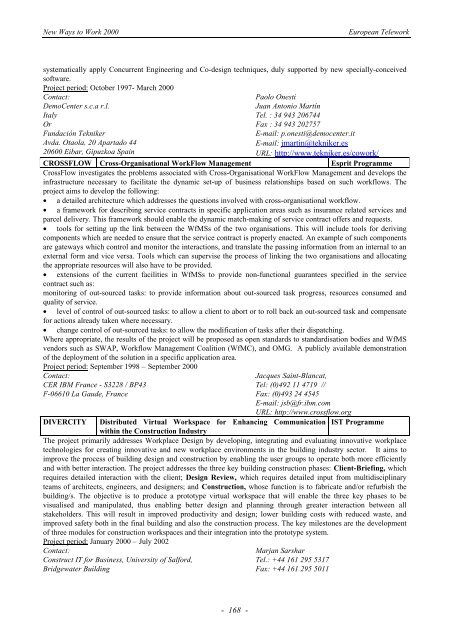eWORK 2000 - European Telework Week
eWORK 2000 - European Telework Week
eWORK 2000 - European Telework Week
- No tags were found...
Create successful ePaper yourself
Turn your PDF publications into a flip-book with our unique Google optimized e-Paper software.
New Ways to Work <strong>2000</strong><strong>European</strong> <strong>Telework</strong>systematically apply Concurrent Engineering and Co-design techniques, duly supported by new specially-conceivedsoftware.Project period: October 1997- March <strong>2000</strong>Contact:DemoCenter s.c.a r.l.ItalyOrFundación TeknikerAvda. Otaola, 20 Apartado 4420600 Eibar, Gipuzkoa SpainPaolo OnestiJuan Antonio MartínTel. : 34 943 206744Fax : 34 943 202757E-mail: p.onesti@democenter.itE-mail: jmartin@tekniker.esURL: http://www.tekniker.es/cowork/CROSSFLOW Cross-Organisational WorkFlow Management Esprit ProgrammeCrossFlow investigates the problems associated with Cross-Organisational WorkFlow Management and develops theinfrastructure necessary to facilitate the dynamic set-up of business relationships based on such workflows. Theproject aims to develop the following:• a detailed architecture which addresses the questions involved with cross-organisational workflow.• a framework for describing service contracts in specific application areas such as insurance related services andparcel delivery. This framework should enable the dynamic match-making of service contract offers and requests.• tools for setting up the link between the WfMSs of the two organisations. This will include tools for derivingcomponents which are needed to ensure that the service contract is properly enacted. An example of such componentsare gateways which control and monitor the interactions, and translate the passing information from an internal to anexternal form and vice versa. Tools which can supervise the process of linking the two organisations and allocatingthe appropriate resources will also have to be provided.• extensions of the current facilities in WfMSs to provide non-functional guarantees specified in the servicecontract such as:monitoring of out-sourced tasks: to provide information about out-sourced task progress, resources consumed andquality of service.• level of control of out-sourced tasks: to allow a client to abort or to roll back an out-sourced task and compensatefor actions already taken where necessary.• change control of out-sourced tasks: to allow the modification of tasks after their dispatching.Where appropriate, the results of the project will be proposed as open standards to standardisation bodies and WfMSvendors such as SWAP, Workflow Management Coalition (WfMC), and OMG. A publicly available demonstrationof the deployment of the solution in a specific application area.Project period: September 1998 – September <strong>2000</strong>Contact:CER IBM France - S3228 / BP43F-06610 La Gaude, FranceJacques Saint-Blancat,Tel: (0)492 11 4719 //Fax: (0)493 24 4545E-mail: jsb@fr.ibm.comURL: http://www.crossflow.orgIST ProgrammeDIVERCITY Distributed Virtual Workspace for Enhancing Communicationwithin the Construction IndustryThe project primarily addresses Workplace Design by developing, integrating and evaluating innovative workplacetechnologies for creating innovative and new workplace environments in the building industry sector. It aims toimprove the process of building design and construction by enabling the user groups to operate both more efficientlyand with better interaction. The project addresses the three key building construction phases: Client-Briefing, whichrequires detailed interaction with the client; Design Review, which requires detailed input from multidisciplinaryteams of architects, engineers, and designers; and Construction, whose function is to fabricate and/or refurbish thebuilding/s. The objective is to produce a prototype virtual workspace that will enable the three key phases to bevisualised and manipulated, thus enabling better design and planning through greater interaction between allstakeholders. This will result in improved productivity and design; lower building costs with reduced waste, andimproved safety both in the final building and also the construction process. The key milestones are the developmentof three modules for construction workspaces and their integration into the prototype system.Project period: January <strong>2000</strong> – July 2002Contact:Construct IT for Business, University of Salford,Bridgewater BuildingMarjan SarsharTel.: +44 161 295 5317Fax: +44 161 295 5011- 168 -








